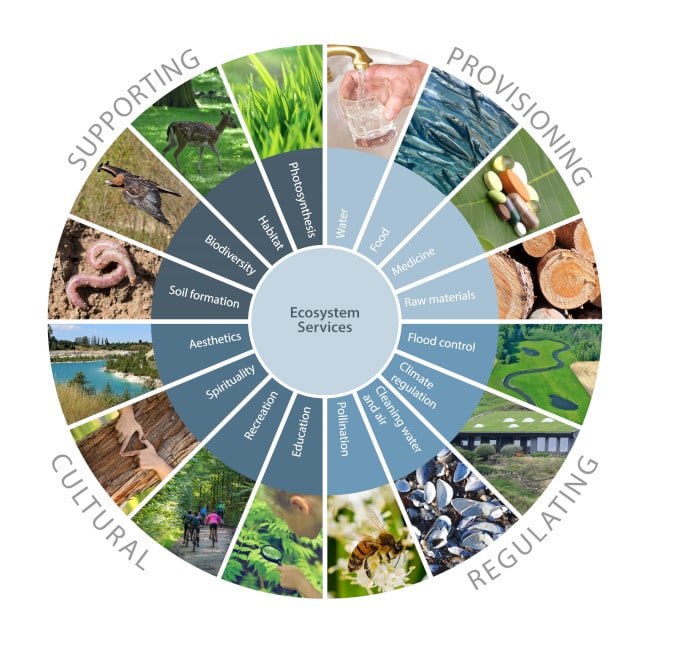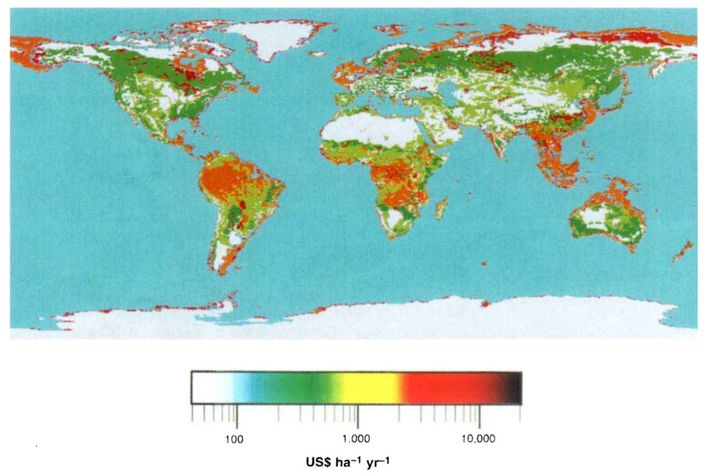Biodiversity loss and the ecological crisis have become hot topics in recent years but why does the loss of biological diversity matter to humans and what problems could we be facing as this crisis escalates? Here, we explore some of the ways in which losing biodiversity could impact our lives.
—
Biodiversity loss describes the loss of life on Earth at different levels from reductions in genetic diversity to the collapse of entire ecosystems. In addition to its intrinsic value, biodiversity underpins ecosystem services which provide the backbone of the global economy.
Ecosystem services are the natural processes provided by healthy ecosystems that provide a wide range of benefits to humans. Ecosystem services include the benefits of pollination provided by animals or the natural processes that recycle nutrients to support the formation of fertile soils which allow for greater crop yields. Cultural ecosystem services are also provided, for example, through the aesthetic value of nature which can generate money via ecotourism as well as improving people’s mental health.
Processing and long-range transport dissociates the products from their place of origin, so it is easy for us to forget that rampant ecological destruction and biodiversity loss is unsustainable if humans are to survive. What we take for granted now can disappear from one day to the other, as COVID-19 showed the world.

Source: Aarhus University, Department of Environmental Science.
A paper led by Robert Costanza in 1997 calculated that the global value of ecosystem services is US$33 trillion annually which is similar to the total global GDP at that time.
Biodiversity and these ecosystem services can be lost through human activities such as land use changes and because these services are often not assigned a direct economic value, they can be degraded to generate short-term economic gains. Eroding these services by losing biodiversity leads to an unsustainable economy and leaves communities with reduced health and well-being standards, therefore, halting the loss of biodiversity is essential for preventing a crash in the global economy and preventing tensions and conflicts from arising within society.
A startling example illustrating how the loss of biodiversity can lead to the dissolution of ecosystem services can be seen in the apple and pear orchards of Sichuan, China where the loss of insect pollinator diversity has meant the trees must now be hand pollinated. The absence of pollinators here has been caused by the destruction of pollinator habitat and the overuse of pesticides that are toxic to insect pollinators. As a consequence, labourers in this region are armed with a paintbrush and a pot of pollen and must pollinate each individual flower by hand which may not always be an economically viable solution due to the rising cost of labour and declining fruit yields.

Source: HuffPost, Kevin Frayer.
The higher concentration of biodiversity in warm, low-latitude regions means the value of ecosystem services tends to be greatest here, despite many of the countries in these regions being economically some of the poorest. For example, coral reefs grow in low-latitude, tropical regions and support enormous amounts of biodiversity which provides ecosystem services with a global value of US$9.9 trillion annually.

Global Map of the Value of Ecosystem Services. Costanza et al. (1997).
A 2013 report by The World Bank stated that people living in poverty are around 20% more likely than the global average to live in rural regions and are 22% more likely to be working in agriculture, mostly through smallholder farming. This way of life is highly reliant on the healthy functioning of ecosystem services to provide high crop yields and it is likely that these people would lack the technology to overcome the new challenges from losing these natural services.
This raises issues of environmental justice, as a disproportionate fraction of the activities leading to the global degradation of ecosystem services is caused by wealthy, developed nations. For example, 79% of historical carbon dioxide emissions have come from developed countries and these greenhouse gas emissions increase the frequency and severity of floods and droughts globally which can dramatically reduce crop yields.
It is clear that a new international framework of regulations needs to be imposed to bring to a halt the unprecedented loss of biodiversity and protect the ecosystem services that provide the foundations for human civilisation. Fines and financial incentives need to be imposed to put an economic value on nature and developed nations have a responsibility to funnel resources to poorer regions to help them conserve ecosystems which will pave the way to a more sustainable and just future.
This article was written by Sammy Witchalls. Cover photo by S N Pattenden on Unsplash.
You might also like: How Many Marine Animals Does Ocean Plastic Kill?
biodiversity loss can affect humans, biodiversity loss humans











![The Statistics of Biodiversity Loss [2020 WWF Report]](https://u4d2z7k9.rocketcdn.me/wp-content/uploads/2020/12/lprwinkyTHB-544x306.jpg)





